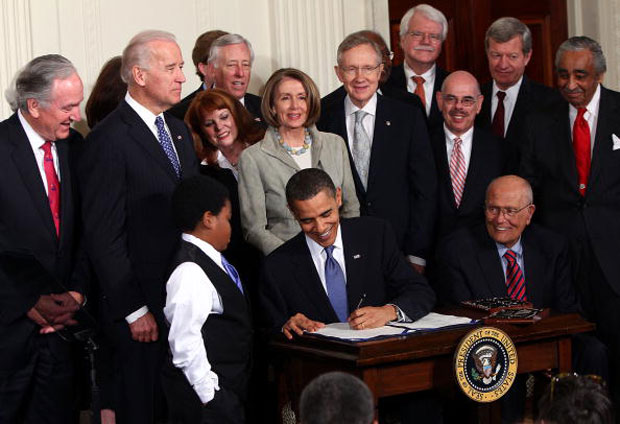If the health-care bill signed into law by President Obama today delivers on its promises, it's likely to down as the first ripple in a tidal wave of health-care information-technology innovation.
It buoys last year's economic stimulus act, which slotted almost $20 billion to expanding health information technology (HIT). The new bill puts an even greater emphasis on electronic medical records and payment systems, for example, as the keys to successful health care reform.
And while the government is overhauling its own health care agencies first and foremost, its effects on the use of medical technology will certainly impact the private sector. According to a recent report from Accenture, for example, almost 60% of U.S. physicians in smaller practices who don’t use electronic medical records (EMRs) intend to purchase an EMR system within the next two years. That would be a leap from today's 6%. The biggest reason for the change? Federal legislation, which includes federal penalties for non-adoption.
The Affordable Health Care for America Act makes repeated references to health information technology, which was already a key theme of last year's economic stimulus act (ARRA), and focuses specifically on HIT as a key component of patient data collection and a way to share research findings. It makes repeated references to the Office of the National Coordinator for Health Information Technology (ONC) and devotes an entire section to HIT enrollment standards and protocols: "Not later than 180 days after the date of enactment of this title, the Secretary, in consultation with the HIT Policy Committee and the HIT Standards Committee, shall develop interoperable and secure standards and protocols that facilitate enrollment of individuals in Federal and State health and human services programs."
In other words, government agencies are going to start developing safe, inviting uses of this technology--and soon.
For tech companies, this could be a bounty. Here are a few to watch:
- Listed health IT specialists. The impact of the bill could already be felt on companies specializing in health IT such as McKesson, whose stock hit a 52-week high on Monday. Other names such as eHealth and Athena Health were bandied about by investors as potential big beneficiaries, too.
- Google Health and Microsoft offer personal health record services. Could these platforms get a boost and enter mainstream use? (The Hippocratic Oath, "Do no harm," is frighteningly similar to Google's corporate motto, "Don't be evil.")
- Smaller IT companies. Among those recently making news are: Biometric Technologies of Florida has developed BioClaim, a "software product specifically developed for the detection of fraudulent health care claims;"
- Indiana-based iSALUS is selling OfficeEMR, a web-based EMR, scheduling, billing, and collections solution;
- Sweden's Catrel sells a "Mobipen Care digital pen" that turns handwritten documents into digital data that can be stored in computer systems.
- The health care overhaul screams for the introduction of a smart card such as the "Carte Vitale" used by France's national health-care service. Proponents of the smart card tout the fact that cards reduce useless and repetitive paperwork, cutting waste and minimizing human errors. Can it become the norm in the U.S. too? Much still needs to be done to decide what kind of information will be stored on those cards and how compatible they will be across the massive and fragmented U.S. health care market.


No comments:
Post a Comment
Comments to this blog must meet the standards of the High Trust BNI leadership team. If your comments are rude, unproductive, or in any way defaming, your comments will be removed, your access to the blog blocked, and you will be put on the banned list. Thank you for making this blog a positive and constructive environment.